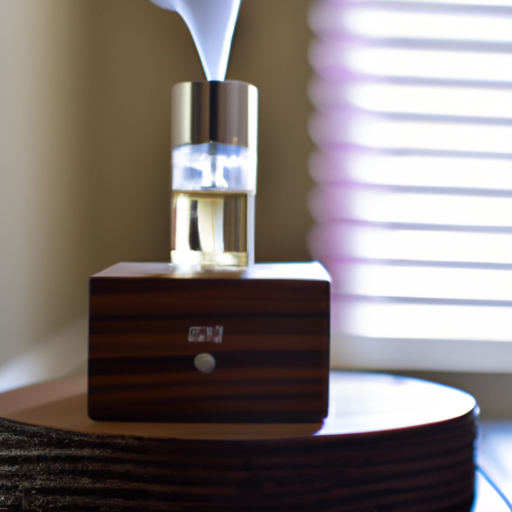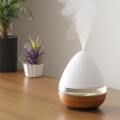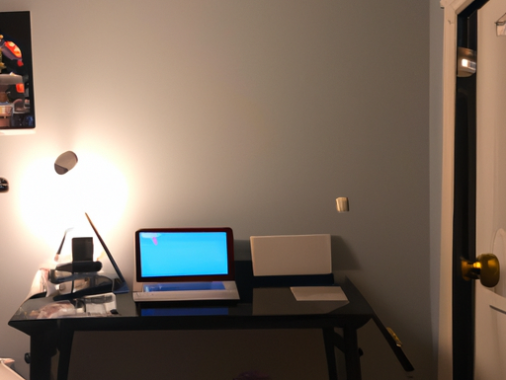-
Table of Contents
- Introduction
- How to Maximize the Duration of Essential Oils in the Air After Diffusing
- The Benefits of Diffusing Essential Oils and How Long They Last
- How to Make Essential Oils Last Longer in the Air After Diffusing
- The Science Behind Essential Oils and How Long They Stay in the Air After Diffusing
- How to Choose the Right Essential Oils for Longer Lasting Diffusions
- The Best Ways to Clean Up Essential Oils After Diffusing
- How to Use Essential Oils to Create a Long-Lasting Aromatic Environment
- Q&A
- Conclusion
Introduction
Essential oils are a popular way to add a pleasant scent to a room, but how long do they stay in the air after diffusing? This is an important question to consider when deciding how often to diffuse essential oils. In this article, we will discuss the factors that affect how long essential oils stay in the air after diffusing, as well as tips for making the scent last longer.
How to Maximize the Duration of Essential Oils in the Air After Diffusing
Essential oils are a popular way to add a pleasant scent to a room, but the scent can quickly dissipate. To maximize the duration of essential oils in the air after diffusing, there are several steps that can be taken.
First, it is important to use a quality diffuser. A good diffuser will be able to disperse the essential oils into the air more effectively, allowing them to linger for a longer period of time. Additionally, it is important to use the right amount of essential oil. Too much oil can cause the scent to become overwhelming, while too little oil will not be able to provide a lasting scent.
Second, it is important to choose the right essential oils. Some essential oils are more volatile than others, meaning they evaporate more quickly. Choosing oils that are less volatile will help to ensure that the scent lasts longer.
Third, it is important to keep the room temperature and humidity levels in mind. Higher temperatures and humidity levels can cause the essential oils to evaporate more quickly, while lower temperatures and humidity levels can help to keep the scent in the air for a longer period of time.
Finally, it is important to keep the diffuser clean. Essential oils can build up on the diffuser, which can reduce its effectiveness and cause the scent to dissipate more quickly. Regularly cleaning the diffuser will help to ensure that it is working properly and that the essential oils are being dispersed effectively.
By following these steps, it is possible to maximize the duration of essential oils in the air after diffusing. Doing so will help to ensure that the scent of the essential oils lingers for a longer period of time.
The Benefits of Diffusing Essential Oils and How Long They Last
Diffusing essential oils is a popular way to enjoy the therapeutic benefits of aromatherapy. Essential oils are highly concentrated plant extracts that are known for their healing properties. When diffused, essential oils can help to reduce stress, improve mood, and promote relaxation.
The most common way to diffuse essential oils is with an essential oil diffuser. This device uses ultrasonic waves to disperse the essential oil molecules into the air. The diffuser also adds moisture to the air, which can help to reduce dryness and improve air quality.
When diffusing essential oils, it is important to consider the size of the room and the type of oil being used. Generally, it is recommended to use 3-5 drops of essential oil per 100 square feet of space. For larger rooms, more drops may be needed. It is also important to consider the type of oil being used. Some oils, such as citrus oils, are more potent and should be used sparingly.
The length of time that essential oils last when diffused depends on the type of oil being used. Some oils, such as lavender, can last up to four hours. Other oils, such as peppermint, may only last for an hour or two. It is important to keep in mind that the scent of the oil will fade over time, so it is best to turn off the diffuser when the desired effect has been achieved.
Overall, diffusing essential oils can be a great way to enjoy the therapeutic benefits of aromatherapy. By considering the size of the room and the type of oil being used, it is possible to enjoy the benefits of essential oils for hours at a time.
How to Make Essential Oils Last Longer in the Air After Diffusing
Essential oils are a great way to add a pleasant scent to any room. Diffusing essential oils into the air is a popular way to enjoy their aroma, but the scent can dissipate quickly. To make essential oils last longer in the air after diffusing, there are a few simple steps you can take.
First, use a cold-air diffuser. Cold-air diffusers use a fan to disperse the essential oils into the air, which helps the scent linger longer. Additionally, using a larger diffuser can help the scent last longer, as it will disperse more essential oil into the air.
Second, use a carrier oil. Adding a carrier oil to the essential oil can help the scent last longer. Carrier oils are typically made from vegetable oils, such as coconut, jojoba, or almond oil. Adding a few drops of the carrier oil to the essential oil before diffusing can help the scent last longer.
Third, use a higher concentration of essential oil. Using a higher concentration of essential oil will help the scent last longer. However, it is important to be mindful of the amount of essential oil used, as too much can be overwhelming.
Finally, keep the diffuser in a closed space. Keeping the diffuser in a closed space, such as a bedroom or bathroom, can help the scent last longer. This is because the essential oils will not be able to escape the room as quickly.
By following these simple steps, you can make essential oils last longer in the air after diffusing. Enjoy the pleasant aroma of essential oils for longer with these tips.
The Science Behind Essential Oils and How Long They Stay in the Air After Diffusing
Essential oils are highly concentrated plant extracts that are used for a variety of purposes, including aromatherapy, massage, and skin care. They are known for their therapeutic properties, which can help to reduce stress, improve mood, and promote relaxation. But how long do essential oils stay in the air after diffusing?
The answer to this question depends on several factors, including the type of essential oil used, the size of the room, and the type of diffuser. Generally speaking, essential oils will remain in the air for up to four hours after diffusing. However, this can vary depending on the type of oil used and the size of the room.
The type of essential oil used can also affect how long it stays in the air. Oils with a higher volatility, such as citrus oils, will evaporate more quickly than oils with a lower volatility, such as sandalwood. Additionally, some oils, such as eucalyptus, have a higher molecular weight, which means they will stay in the air longer.
The size of the room can also affect how long essential oils stay in the air. In a larger room, the essential oils will disperse more quickly, while in a smaller room, the oils will linger for a longer period of time. Additionally, the type of diffuser used can also affect how long the essential oils stay in the air. For example, a nebulizing diffuser will disperse the essential oils more quickly than an ultrasonic diffuser.
In conclusion, the amount of time essential oils stay in the air after diffusing can vary depending on the type of oil used, the size of the room, and the type of diffuser. Generally speaking, essential oils will remain in the air for up to four hours after diffusing. However, this can vary depending on the type of oil used and the size of the room.
How to Choose the Right Essential Oils for Longer Lasting Diffusions
When it comes to diffusing essential oils, it is important to choose the right oils for longer lasting diffusions. Essential oils are highly concentrated and can be used to create a pleasant aroma in any room. However, some essential oils evaporate more quickly than others, so it is important to choose the right oils for longer lasting diffusions.
The first step in choosing the right essential oils for longer lasting diffusions is to consider the type of oil. Some essential oils, such as citrus oils, evaporate quickly and will not last as long as other oils. On the other hand, heavier oils such as sandalwood and patchouli will last longer. It is important to choose oils that will last longer in order to get the most out of your diffusions.
The second step is to consider the concentration of the oil. Essential oils are highly concentrated and should be used sparingly. If you use too much oil, it will evaporate quickly and will not last as long. It is important to use the right amount of oil for the size of the room you are diffusing in.
The third step is to consider the type of diffuser you are using. Different diffusers will disperse the essential oils differently, so it is important to choose the right diffuser for the type of oil you are using. For example, a nebulizing diffuser will disperse the essential oils more quickly than an ultrasonic diffuser.
Finally, it is important to consider the environment in which you are diffusing. If you are diffusing in a room with a lot of air movement, such as a fan or air conditioner, the essential oils will evaporate more quickly. On the other hand, if you are diffusing in a room with little air movement, the essential oils will last longer.
By following these steps, you can ensure that you are choosing the right essential oils for longer lasting diffusions. Essential oils are a great way to create a pleasant aroma in any room, and by choosing the right oils and diffuser, you can get the most out of your diffusions.
The Best Ways to Clean Up Essential Oils After Diffusing
Essential oils are a popular way to add a pleasant scent to a room, but they can also leave behind a residue. Cleaning up essential oils after diffusing is important to ensure that the oils do not damage surfaces or cause any health issues. Here are the best ways to clean up essential oils after diffusing.
1. Use a damp cloth. A damp cloth is the simplest and most effective way to clean up essential oils after diffusing. Simply wipe down any surfaces that have been exposed to the oils, such as walls, furniture, and floors.
2. Use a vacuum cleaner. Vacuuming is a great way to remove any essential oil residue from carpets and upholstery. Make sure to use a vacuum cleaner with a HEPA filter to ensure that the oils are not released back into the air.
3. Use a natural cleaner. Natural cleaners, such as vinegar and baking soda, can be used to clean up essential oils after diffusing. Simply mix equal parts of vinegar and water in a spray bottle and spray the affected area. Allow the mixture to sit for a few minutes before wiping it away with a damp cloth.
4. Use an essential oil cleaner. There are also special cleaners designed specifically for cleaning up essential oils. These cleaners are usually made from natural ingredients and are safe to use on most surfaces.
By following these steps, you can easily clean up essential oils after diffusing and ensure that your home remains free of any residue.
How to Use Essential Oils to Create a Long-Lasting Aromatic Environment
Creating a long-lasting aromatic environment with essential oils is a simple and effective way to bring a pleasant scent to any space. Essential oils are natural, plant-based oils that are extracted from flowers, leaves, roots, and other parts of plants. They are highly concentrated and have a variety of therapeutic benefits, including calming, energizing, and uplifting effects.
To create a long-lasting aromatic environment with essential oils, you will need an essential oil diffuser. Diffusers come in a variety of shapes and sizes, and they work by dispersing essential oils into the air. You can also use a spray bottle to mist essential oils into the air, but this method is not as effective as using a diffuser.
When selecting essential oils for your diffuser, it is important to choose oils that are high quality and pure. Look for oils that are labeled “therapeutic grade” or “aromatherapy grade” to ensure that you are getting the best quality.
Once you have selected your essential oils, you can begin to create your aromatic environment. Start by adding a few drops of essential oil to your diffuser. You can experiment with different combinations of oils to create a unique scent. For example, you could combine lavender and chamomile for a calming effect, or peppermint and eucalyptus for an energizing effect.
To make your aromatic environment last longer, you can add a few drops of essential oil to a cotton ball and place it in a small bowl or container. This will help to disperse the scent throughout the room. You can also add a few drops of essential oil to a potpourri mix or to a bowl of dried flowers.
Finally, you can use essential oils to create a pleasant scent in your home by adding a few drops to a spray bottle filled with water. Spray the mixture around the room to create a long-lasting aromatic environment.
Creating a long-lasting aromatic environment with essential oils is a simple and effective way to bring a pleasant scent to any space. With the right essential oils and diffuser, you can create a unique and therapeutic scent that will last for hours.
Q&A
1. How long do essential oils stay in the air after diffusing?
The length of time essential oils stay in the air after diffusing depends on the type of oil, the size of the room, and the type of diffuser used. Generally, the scent of essential oils can last anywhere from 30 minutes to several hours.
2. What factors affect how long essential oils stay in the air?
The type of oil, the size of the room, and the type of diffuser used all affect how long essential oils stay in the air. Oils with heavier molecules, such as sandalwood, tend to linger longer than lighter oils, such as citrus. Larger rooms require more oil to fill the space, and certain diffusers, such as nebulizers, can disperse the oil more effectively.
3. Are there any tips for making essential oils last longer in the air?
Yes, there are several tips for making essential oils last longer in the air. First, use a diffuser that is designed to disperse the oil more effectively, such as a nebulizer. Second, use a larger amount of oil in larger rooms. Third, use heavier oils, such as sandalwood, which tend to linger longer. Finally, use a fan to circulate the oil throughout the room.
4. Can essential oils be used to freshen the air in a room?
Yes, essential oils can be used to freshen the air in a room. Diffusing essential oils can help to eliminate odors and create a pleasant atmosphere.
5. Are there any safety precautions to consider when diffusing essential oils?
Yes, there are several safety precautions to consider when diffusing essential oils. First, make sure to use a diffuser that is designed for essential oils. Second, keep the diffuser away from children and pets. Third, do not diffuse essential oils around open flames or in an enclosed space. Finally, be aware of any allergies or sensitivities that may be present in the room.
6. Are there any health benefits associated with diffusing essential oils?
Yes, there are several health benefits associated with diffusing essential oils. Diffusing essential oils can help to reduce stress and anxiety, improve sleep, and boost mood. Additionally, some essential oils have antibacterial and antiviral properties, which can help to purify the air and reduce the risk of infection.
7. Are there any other uses for essential oils besides diffusing?
Yes, there are several other uses for essential oils besides diffusing. Essential oils can be used in massage, aromatherapy, and skin care products. Additionally, some essential oils can be used in cooking and baking to add flavor and aroma.
Conclusion
In conclusion, essential oils can stay in the air for up to several hours after diffusing, depending on the type of oil used, the amount of oil used, and the size of the room. The best way to ensure that essential oils stay in the air for a longer period of time is to use a larger diffuser and to use more oil. Additionally, using a fan or opening a window can help to disperse the oils more quickly.




